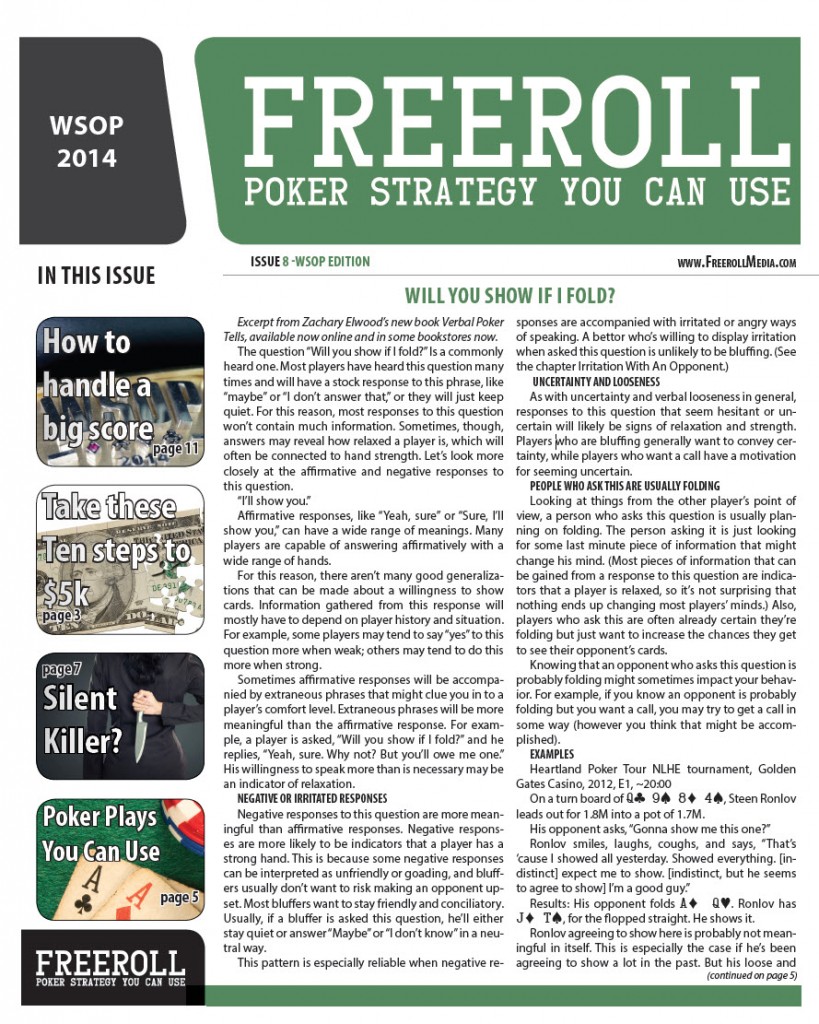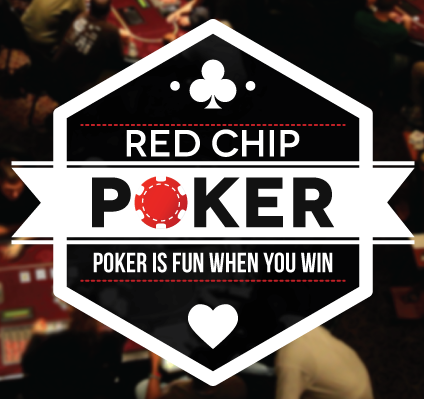Poker Is A Skill: How to Stop Losing, Part 5
- By Paul Hoppe
- May 1, 2014
- Comments Off on Poker Is A Skill: How to Stop Losing, Part 5
Embrace Variance
It’s hard to spend time around poker players without listening to a bad beat story. It’s hard to play poker without coming up with some of your own.
“So there I was, sitting around all night, waiting for a good hand. I had been cold all night until I look down and see two queens. My salvation, right? Well…the flop comes out queen-eight-four and this guy check/raises me. We get the money in, and guess what he’s got? Queen-eight! Great spot, right? Well, of course the turn and river are the two last eights in the deck, and I lose to quads. Do you know what the odds are of that happening?”
Yes! We do know the odds of that happening. It’s 989-to-1 against. We know this because we learned about odds in Part 4: Know The Odds. On the flop, there are 45 unknown cards. (That’s 52 minus the 3 cards on the flop, the 2 cards in our hand, and the 2 cards in our opponent’s hand.) The turn will be an eight 2 out of 45 times. On the river, there are only 44 cards left in the deck because we’ve already seen the turn card (which we’ll assume was an eight). There is only one eight left in the deck now, so the river will be an eight 1 time in 44. Multiply 45 by 44 and you get 1980. Since there are 2 ways for this to happen out of 1980 possible sequences of board run outs, we divide 1980 by 2 and get 990. So it will happen once in 990 tries.
Stated differently, the odds are 989-to-1 against this worst-possible beat occurring. Top set of queens will hold up 989 times for every 1 time the queen-eight makes runner runner quads. So what’s the moral of this story? Our hero got impossibly unlucky? No.
Our hero did get exceptionally unlucky, but not impossibly so. This is as unlucky as you can get in a hand of Texas Holdem. The opponent needs two precise cards on the turn and river and gets both of them. But the takeaway here is that if you play this scenario out enough times, our hero will lose about one out of every thousand trials. That 1 in 990 means that this will eventually happen to you if you play enough poker. A 0.1% chance of something happening (1-in-1000) is extremely small if it has only one chance to happen. But 0.1% of 1,000,000 trials is 1,000 events. That’s rather a lot.
Most bad beats are not this bad, because this is the worst one possible. Most bad beats are something like, “I flopped a set and the flush got there.” How often will a flush draw beat a set? About 1 time in every 4 trials. So if you get it all in a few times with a set against a flush draw, you’re likely to lose one of those pots. That’s the way poker is built. It’s a drawing game.
So what should I do?
Embrace variance. Don’t just accept it. Embrace it. Variance is the only reason you can make money as a poker player. Without variance, almost no one would play poker, and even fewer would play it for money.
If you are a weak poker player who gets your money in bad (i.e. you make bad bets against the odds), then without variance you would never win a big pot. That’s no fun. And people play poker for fun.
If you’re a decent-to-good player who is trying to play with weaker players, then you won’t get much action. The weaker players will quickly discover that they cannot beat you and they will quit playing.
Lots of people love going to the casino and making negative EV bets. If they make these bets over and over and over again, they’ll eventually lose money. Guaranteed. But if they just play for a few hours, there’s a decent chance they’ll go home a winner. Even if they lose on the trip, they’ll win some of their bets and have some fun.
Imagine a casino that pays out the exact odds instead of spinning the roulette wheel. You bet $100 on black? Great. Here’s $94.74 of it back. You want to let it ride? Now you’ve got $89.75. You’ve just lost $10.25 with no chance of winning. Does that sound fun to you? Probably not. The element of chance makes the game fun for some people. That’s what gambling is.
In addition to adding excitement and unpredictability to the game of poker, chance also obfuscates the relative skill levels of the players. In a game of chess, a great player will quickly demonstrate their superiority to a weak player. But in poker, this can take much longer. It takes thousands of hands before the results show which player is stronger. A skilled player may be able to tell the difference simply by watching one hand, but an unskilled player may have no clue.
But sometimes I lose four sets in a row!
Yep. That’s gonna happen. It’s good for the game in the long run, but it sucks for you in the short run. If you’re supposed to lose 1 out of 4 tries, that doesn’t mean that you will lose exactly 1 out of every 4 tries. It means that out of the total number of times you ever have a set against a flush draw, you should expect to win about three-quarters of those.
If your opponent has a 1-in-4 chance of winning that first hand and a 1-in-4 chance of winning the second, then there’s a 1-in-16 chance that he’ll win both times. There’s also a 9-in-16 chance he’ll win neither time. So you’ll escape unscathed over half the time.
If we look at the chances that you’ll lose all four of those sets in a row, it’s 255-to-1 against. Those are long odds. It’s probably not going to happen this time. But if you play poker long enough, you’ll see it happen. You’ll see a lot of crazy things happen. Some of them will be excruciating. Some will be pretty awesome.
But I still hate bad beats.
Yeah. I’m with you on that. They’re no fun. But without them, there would be no poker. So find a way to deal with them. Stay on your game. Do not deviate to avoid discomfort. In the long run, strong play against weaker players will get the money. So go get the money.



